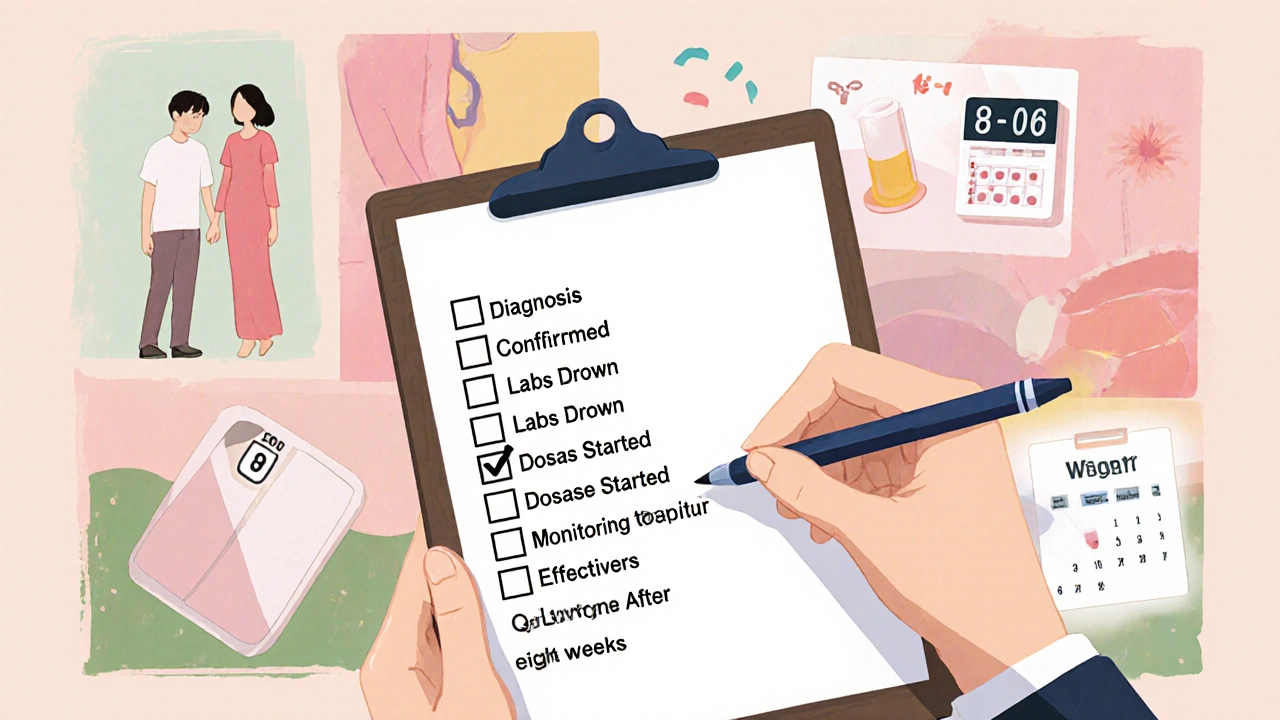Aripiprazole for PE Checklist
Checklist: Is Aripiprazole Right for Your Patient?
1. Diagnosis Confirmation
2. Treatment History
3. Risk Assessment
4. Patient Factors
Quick Takeaways
- Aripiprazole is a dopamine partial agonist used mainly for schizophrenia and bipolar disorder.
- Premature ejaculation (PE) affects up to 30% of men and is usually managed with SSRIs or topical anesthetics.
- Off‑label case series suggest aripiprazole may delay ejaculation, but robust clinical trials are scarce.
- Potential benefits must be weighed against psychiatric side effects, metabolic changes, and drug interactions.
- A structured checklist helps clinicians decide if aripiprazole is worth trying for PE.
When you hear the phrase aripiprazole premature ejaculation, you probably wonder whether an antipsychotic can double as a sex‑therapy drug. The short answer is: it’s possible, but the evidence is still patchy. This guide walks through what aripiprazole actually does, why it might affect ejaculatory timing, what research says, and how to use it safely if you or a patient decide to give it a shot.
What Is Aripiprazole?
Aripiprazole is a second‑generation antipsychotic that works primarily as a dopamine D2‑receptor partial agonist. It was first approved by the FDA in 2002 for schizophrenia and later for bipolar I disorder, adjunctive treatment of major depressive disorder, and irritability associated with autism. Because it modulates dopamine without fully blocking it, aripiprazole tends to cause fewer classic antipsychotic side effects like severe motor rigidity or prolactin elevation.
What Is Premature Ejaculation?
Premature ejaculation (PE) is a common male sexual dysfunction characterized by ejaculation that occurs sooner than desired, often within one minute of vaginal penetration. It can be lifelong (primary) or develop later (acquired). The condition is linked to psychological stress, altered serotonin pathways, and sometimes underlying medical issues such as prostatitis or thyroid disorders.
How Aripiprazole Might Influence Ejaculation
Aripiprazole’s main action-partial activation of dopamine D2 receptors-leads to a more balanced dopamine tone in the brain. Dopamine and serotonin are the two neurotransmitters most implicated in ejaculatory control. While serotonin generally inhibits ejaculation, dopamine tends to facilitate it. By acting as a stabilizer rather than a full blocker, aripiprazole may dampen excess dopaminergic spikes that trigger rapid ejaculation.
In addition, aripiprazole has modest activity at serotonin 5‑HT1A receptors (partial agonist) and low affinity for 5‑HT2A receptors (antagonist). This mixed profile can modestly increase serotonergic tone without the full‑blown side‑effects seen with selective serotonin reuptake inhibitors (SSRIs). The net effect in some men appears to be a longer latency before orgasm.
Why Sexual Side Effects Matter in Antipsychotics
Many antipsychotics cause sexual dysfunction-reduced libido, erectile issues, or delayed ejaculation-by raising prolactin or blocking dopamine. Ironically, those same side effects sparked interest in using certain antipsychotics to treat PE. Aripiprazole stands out because it typically causes less prolactin rise and has a milder impact on libido, making it a candidate for off‑label use.
What Does the Evidence Say?
Research on aripiprazole for PE consists mainly of small open‑label studies and case reports. A 2018 Turkish case series followed 15 men with refractory PE who were already on low‑dose aripiprazole for mood stabilization. After six weeks, mean intravaginal ejaculatory latency time (IELT) rose from 0.9 minutes to 2.4 minutes, with minimal psychiatric destabilization.
Another 2021 pilot trial in South Korea compared 10 mg of aripiprazole daily to placebo in men with lifelong PE. The aripiprazole group showed a mean IELT increase of 1.1 minutes versus 0.3 minutes in the placebo arm. However, the study was under‑powered (n=30) and lacked long‑term follow‑up.
Large‑scale randomized controlled trials (RCTs) are still missing. The scarcity of high‑quality data means clinicians must treat the existing evidence as preliminary-promising but not definitive.

How Aripiprazole Stacks Up Against Standard PE Therapies
| Parameter | Aripiprazole (off‑label) | SSRIs (e.g., Dapoxetine) | Topical Anesthetics (e.g., Lidocaine‑prilocaine) |
|---|---|---|---|
| Typical dose for PE | 5-15 mg once daily | 30-60 mg as needed (short‑acting) or daily low‑dose | 5 % cream applied 10-15 min before sex |
| Mean IELT increase (studies) | +1.0 - +1.5 min (small trials) | +2.0 - +3.0 min (RCTs) | +1.5 - +2.0 min (controlled studies) |
| Onset of effect | 2-4 weeks (steady‑state) | 30 min-1 hour (short‑acting) | 10-15 min (local anesthetic) |
| Common side effects | Akathisia, insomnia, mild weight gain | Nausea, dizziness, decreased libido | Paresthesia, temporary loss of sensation |
| Impact on mood/psychiatric condition | Can improve underlying depression or anxiety | Generally neutral; some mood worsening reported | None |
In short, SSRIs remain the most evidence‑backed option for PE, offering larger IELT gains and faster onset. Aripiprazole’s advantage is its dual benefit for patients who also need mood stabilization, but it comes with the baggage of antipsychotic monitoring.
Practical Considerations for Using Aripiprazole
If you or a patient is already taking aripiprazole for a psychiatric indication, a modest increase in dose (up to 15 mg) might also improve ejaculatory control. For men without a psychiatric diagnosis, prescribing aripiprazole solely for PE is off‑label and should involve a thorough risk‑benefit discussion.
- Baseline assessment: Document IELT, partner satisfaction, psychiatric history, and any current medications.
- Dose start: Begin with 5 mg at bedtime to minimize akathisia.
- Titration: Increase by 5 mg weekly if tolerated, aiming for 10-15 mg total.
- Monitoring: Check weight, fasting glucose, lipid panel, and extrapyramidal symptoms every 2-3 months.
- Duration: Re‑evaluate effectiveness after 8 weeks; continue only if IELT improves by at least 1 minute and side effects are acceptable.
Potential Risks and Pitfalls
While aripiprazole is generally well‑tolerated, several cautions apply:
- Akathisia: Restlessness that can actually increase sexual frustration.
- Metabolic changes: Small but real risk of weight gain and elevated fasting glucose.
- Drug interactions: CYP2D6 inhibitors (e.g., fluoxetine) can raise aripiprazole levels, potentially amplifying side effects.
- Psychiatric destabilization: In rare cases, dose changes can trigger mood swings or psychosis relapse.
- Regulatory concerns: Off‑label prescribing requires informed consent and documentation.
Checklist Before Starting Aripiprazole for PE
- Confirm diagnosis of PE with a validated questionnaire (e.g., Premature Ejaculation Diagnostic Tool).
- Rule out reversible causes (thyroid dysfunction, prostatitis, medication side effects).
- Discuss prior PE treatments attempted and why they failed.
- Review psychiatric history: Is the patient already on an antipsychotic or antidepressant?
- Obtain baseline labs: fasting glucose, lipid profile, liver function.
- Explain off‑label nature, potential benefits, and side‑effect profile.
- Start with a low dose (5 mg), schedule follow‑up at 2 and 4 weeks.
- Document IELT and partner satisfaction at each visit.
Bottom Line
Aripiprazole shows enough promise to warrant a trial in select men-particularly those who also need mood stabilization or have failed standard PE therapies. However, the lack of large RCTs means clinicians must tread carefully, monitor side effects, and be ready to switch to proven options if results are modest.

Can aripiprazole be used without a psychiatric diagnosis?
Off‑label use is legal but requires a full risk discussion, informed consent, and close monitoring for metabolic or movement‑related side effects.
How quickly does aripiprazole affect ejaculation timing?
Because the drug needs to reach steady‑state levels, most patients notice changes after 2-4 weeks of consistent dosing.
What are the most common side effects when using aripiprazole for PE?
Mild akathisia, insomnia, occasional nausea, and slight weight gain are the most frequently reported adverse events.
Is aripiprazole more effective than SSRIs for treating PE?
Current data suggest SSRIs still provide a larger average increase in IELT. Aripiprazole may be useful when SSRIs are contraindicated or when a patient also needs mood stabilization.
Do I need to stop other medications before starting aripiprazole?
Not necessarily, but you should avoid strong CYP2D6 inhibitors (like fluoxetine) or adjust doses under medical supervision to prevent excessive drug levels.


14 Comments
Kirsten YoutseyOctober 20, 2025 AT 17:17
One cannot ignore the broader pharmacoeconomic forces that quietly shape off‑label prescriptions. The pharmaceutical lobby has long championed the repurposing of antipsychotics, subtly steering research agendas toward lucrative niches. When aripiprazole is marketed beyond its psychiatric remit, it is less a triumph of science than a calculated expansion of market share. Moreover, the paucity of large‑scale trials is conveniently glossed over by a cascade of low‑budget case series that lack rigorous methodology. Thus, the enthusiasm surrounding its use for premature ejaculation should be tempered by a healthy skepticism of hidden commercial incentives.
Deja ScottOctober 26, 2025 AT 11:10
The cultural context of sexual health often skews clinical priorities.
Mahesh UpadhyayNovember 1, 2025 AT 06:03
Consider the sheer absurdity of positioning a dopamine stabilizer as a love‑enhancement gadget. It sounds like a plot twist from a low‑budget thriller rather than a plausible therapeutic avenue. Yet some clinicians cling to anecdotal victories, mistaking coincidence for causation.
Rajesh MyadamNovember 7, 2025 AT 00:57
I hear the frustration of men who have tried every cream and pill without lasting relief. It is worth noting that the psychological component of premature ejaculation can be just as debilitating as the physiological one. Aripiprazole’s mood‑stabilizing properties might address that hidden factor, provided it is introduced with caution. Monitoring for akathisia and metabolic shifts remains essential. Ultimately, a shared decision‑making process can help balance hope with realism.
Andrew HernandezNovember 12, 2025 AT 19:50
Aripiprazole’s half‑life permits steady dosing. Side effects stay modest if the dose stays low.
Kate McKayNovember 18, 2025 AT 14:43
For those contemplating a trial, start low and move slowly. A 5 mg bedtime dose often sidesteps the restless feeling that higher amounts can provoke. Check weight and fasting glucose after the first month; any upward trend should trigger a reassessment. Communicate openly with your partner about expectations – transparency can alleviate performance anxiety. Remember, the goal is modest improvement, not a miraculous transformation.
Demetri HuylerNovember 24, 2025 AT 09:37
While the elite circles of psychopharmacology celebrate nuanced receptor modulation, the layperson is left juggling headlines about “sex‑boosting pills.” It is a classic case of intellectual elitism masquerading as medical progress. The data, fragmented as it is, barely rise above anecdotal whispers. Yet, the very notion that a schizophrenia drug could double as an intimacy aid fuels a sensationalist narrative that the academic community should quietly dispel.
JessicaAnn SuttonNovember 30, 2025 AT 04:30
The methodological shortcomings of the cited studies are evident. Sample sizes remain minuscule, and blinding protocols are either absent or poorly described. Consequently, the reported increase in intravaginal ejaculatory latency time lacks statistical robustness. Such limitations ought to temper any premature endorsement of aripiprazole for this indication.
Israel EmoryDecember 5, 2025 AT 23:23
It is crucial, therefore, to weigh the modest benefits against the potential metabolic disturbances; patients should undergo baseline lipid and glucose assessments; follow‑up labs every few months can catch early changes; shared decision‑making ensures that both clinician and patient remain aligned on treatment goals.
barnabas jacobDecember 11, 2025 AT 18:17
From a pharmaco‑dynamic standpoint, aripiprazole’s partial agonism at D2 creates a “dopamine tone” that can theoretically delay ejaculation. However, real‑world data is still kinda sketchy-most of it is just case‑series junk. You gotta watch out for akathisia, which can be a real pain in the butt. Also, CYP2D6 interactions can bump up levels unexpectedly, so keep an eye on any co‑prescribed meds. Bottom line: it’s not a silver bullet, but it might be a useful add‑on for a select few.
jessie coleDecember 17, 2025 AT 13:10
In the journey toward sexual confidence, incremental gains often triumph over dramatic leaps. A disciplined titration schedule, beginning with 5 mg at night, can provide the body time to adapt. Regular check‑ins with a healthcare professional safeguard against unforeseen side effects. Moreover, involving the partner in the conversation can foster mutual support and reduce performance pressure. Ultimately, patience and consistency are the true catalysts for lasting improvement.
Matthew HallDecember 23, 2025 AT 08:03
Dude, have you ever wondered why the same big pharma that pushes SSRIs is suddenly hyped about an antipsychotic for sex? It smells like a covert marketing scheme, a hidden agenda to keep us buying more pills. They’ll throw out a tiny case series and suddenly you’ve got a new “miracle” drug. Trust me, the rabbit hole goes deeper than anyone wants you to think.
Vijaypal YadavDecember 29, 2025 AT 02:57
To add a technical nuance, the therapeutic window for aripiprazole in this off‑label use is narrow; plasma concentrations above 0.5 µg/mL have been associated with increased akathisia incidence. Thus, therapeutic drug monitoring, though not routine, could inform dose adjustments in refractory cases.
Ron LanhamJanuary 3, 2026 AT 21:50
It is a moral imperative for clinicians to prioritize patient safety above any seductive promise of quick sexual enhancement. First, the fundamental principle of "do no harm" demands that a drug with a well‑documented side‑effect profile be introduced only after exhaustive exploration of established therapies. Second, the temptation to bypass rigorous trials in favor of anecdotal success undermines the very foundation of evidence‑based medicine. Third, prescribing aripiprazole without a clear psychiatric indication exposes patients to unnecessary metabolic risk, including weight gain and dyslipidemia, which can have lifelong health consequences. Fourth, the specter of akathisia looms large, often manifesting as relentless inner restlessness that can erode the quality of life the treatment seeks to improve. Fifth, insurance providers may deny coverage for off‑label use, leading patients into costly financial burdens that are ethically questionable. Sixth, the legal liability attached to off‑label prescriptions, especially when adverse events occur, can place both practitioner and patient in precarious positions. Seventh, the psychological impact of attributing sexual performance to a medication can foster dependency, eroding intrinsic confidence. Eighth, the broader societal narrative that frames sexual dysfunction as a problem to be solved pharmacologically rather than through holistic counseling perpetuates a reductionist view of human intimacy. Ninth, research funding is diverted away from comprehensive behavioral therapies when pharmaceutical solutions are overly glorified. Tenth, the lack of long‑term data means we cannot reliably predict how chronic aripiprazole exposure will affect endocrine function over decades. Eleventh, the potential for drug‑drug interactions, particularly with CYP2D6 inhibitors, necessitates a level of monitoring that many primary‑care settings are ill‑equipped to provide. Twelfth, informed consent must be exhaustive, covering not only the modest efficacy but also the full spectrum of possible harms. Thirteenth, the clinician’s duty to educate patients about alternative, evidence‑backed options remains unfulfilled if aripiprazole is presented as a first‑line choice. Fourteenth, while some men may experience a modest increase in latency, the variability of response is such that many will derive no benefit, rendering the risk‑reward calculus unfavorable. Finally, it is incumbent upon the medical community to resist the allure of a convenient pharmacologic fix and instead champion a nuanced, multidisciplinary approach that respects both the physiological and psychological dimensions of premature ejaculation.